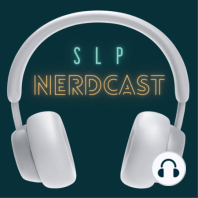59 min listen
Bringing it All Together: Chaining Procedures in AAC
FromSLP Nerdcast
ratings:
Length:
64 minutes
Released:
Oct 12, 2020
Format:
Podcast episode
Description
Get .1 ASHA CEU hereIn this series “Bringing it all Together,” we review different intervention strategies with a focus on implementation. In the last episode of this series, we reviewed Aided Language Modeling, a popular AAC interventions that is commonly used throughout the field of AAC. But there are other interventions, like chaining, that don’t quite get the time in the limelight that they deserve. Chaining interventions in the AAC world might be best known for their role in the PECS ® protocol, however chaining is commonly used throughout AAC interventions without being named.We are excited to present to you the second episode in our series of Bringing it All Together: Chaining Procedures in AAC. Our goal is that you read this article and leave feeling like chaining is the friend you never knew you had.This episode is offered for 1 ASHA CMH (equal to .1 ASHA CEU). If you have questions about CEUs or how this works, please see our How It Works or ASHA Professional Development pages.Learning Outcomes1. Describe a task analysis and relationship to chaining interventions2. Describe the difference between forward chaining, backward chaining, and total task chaining approaches3. Identify specific variables that may make a certain chaining approach a better fit for your clinical needs compared with other chaining approaches or non-chaining approachesReferencesAdams, A. E., Rogers, W. A., & Fisk, A. D. (2013). Skill components of task analysis. Instructional Science, 41(6), 1009-1046. doi:10.1007/s11251-013-9270-9Frost, L., & Mcgowan, J. S. (2011). Strategies for Transitioning From PECS to SGD. Part I: Overview and Device Selection. Perspectives on Augmentative and Alternative Communication, 20(4), 114-118. doi:10.1044/aac20.4.114Preston, J. L., & Leece, M. C. (2017). Intensive Treatment for Persisting Rhotic Distortions: A Case Series. American Journal of Speech-Language Pathology, 26(4), 1066-1079. doi:10.1044/2017_ajslp-16-0232Preston, J. L., Leece, M. C., & Storto, J. (2019). Tutorial: Speech Motor Chaining Treatment for School-Age Children With Speech Sound Disorders. Language, Speech, and Hearing Services in Schools, 50(3), 343-355. doi:10.1044/2018_lshss-18-0081Slocum, S. K., & Tiger, J. H. (2011). An Assessment Of The Efficiency Of And Child Preference For Forward And Backward Chaining. Journal of Applied Behavior Analysis, 44(4), 793-805. doi:10.1901/jaba.2011.44-793Stevenson, B. S., Flynn, P. F., & Test, D. W. (2016). Evidence-Based Practices and Predictors: Improving Post-School Outcomes for Students with Disabilities. Perspectives of the ASHA Special Interest Groups, 1(16), 47-62. doi:10.1044/persp1.sig16.47Online ResourcesEmbrey, D., PhD. (n.d.). TASK ANALYSIS TECHNIQUES - Human Reliability. Retrieved August 28, 2020, from http://www.humanreliability.com/downloads/Task-Analysis-Techniques.pdfVelleman, S., PhD. (1970, November 28). Backward Build-Ups: A Therapy Technique for Multisyllabic Words. Retrieved August 28, 2020, from https://www.apraxia-kids.org/apraxia_kids_library/backward-build-ups-a-therapy-technique-for-multisyllabic-words/When Everything Clicks: The Power Of Judgment-Free Learning. (2018, June 05). Retrieved August 28, 2020, from https://www.npr.org/transcripts/616127481Disclosures:Financial: Kate Grandbois is the owner / founder of Grandbois Therapy + Consulting, LLC and co-founder of SLP Nerdcast. Amy Wonkka is an employee of a public school system and co-founder of SLP Nerdcast.Non-financial: Kate and Amy are both members of ASHA, SIG 12, and both serve on the AAC Advisory Group for Massachusetts Advocates for Children. Kate is a member of the Berkshire Association for Behavior Analysis and Therapy (BABAT), MassABA, the Association for Behavior Analysis International (ABAI) and the corresponding Speech Pathology and Applied Behavior Analysis SIG.Time Ordered Agenda:10 minutes: Introduction, Disclaimers and Disclosures20 minutes: Descriptions of Task Analyses and their role in chaining15 minutes: De
Released:
Oct 12, 2020
Format:
Podcast episode
Titles in the series (100)
Even More Data Collection: Data Collection Systems and Strategies by SLP Nerdcast
